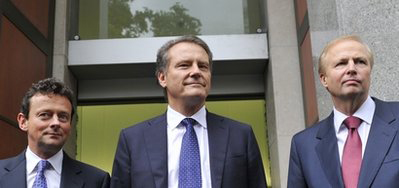-
News >World
BP hopes to turn page with new CEO, leaner company
2010-07-28 11:11NEW ORLEANS - Battered BP began reinventing itself in the shadow of the Gulf of Mexico oil spill Tuesday, naming its first American CEO as it reported a record $17 billion quarterly loss. Its outgoing chief miffed the White House anew with his parting comments.

Members of the British Petroleum executive, from left, outgoing CEO Tony Hayward, Chairman Carl-Henric Svanberg, and incoming CEO Bob Dudley, pose for the media outside their global headquarters in London, Tuesday, July 27, 2010. [Agencies]Robert Dudley, who will replace Tony Hayward on October 1, promised changes in light of the environmental disaster. "There's no question we are going to learn things from this investigation of the incident," he told reporters by phone from London after the announcement was made.
One certain change is that BP will become smaller. It announced it will sell $30 billion in assets and has set aside $32.2 billion to cover costs from the largest offshore oil spill in US history.
Dudley, BP's managing director and current point man on oil spill recovery, defended his company's record and that of the embattled chief executive he will replace.
Hayward, whose verbal miscues intensified the anger Gulf Coast residents already felt, will leave BP with benefits valued at more than $18 million. He told reporters he had been "demonized and vilified" but had no major regrets about his leadership.
"Life isn't fair," he said, but he conceded that wasn't the point. "BP cannot move on in the US with me as its leader."
The White House was not impressed with Hayward's comments.
"What's not fair is what's happened on the Gulf," press secretary Robert Gibbs said. "What's not fair is the actions of some have caused the greatest environmental disaster that our country has ever seen."
BP PLC announced the move Tuesday with an air of making a fresh start, nearly 100 days into a catastrophic mile (1.6 kilometer)-deep blowout that killed 11 workers, spewed 94 million gallons (356 million liters) to 184 million gallons (697 million liters) of oil and sapped 35 percent, or $60 billion, of BP's market value.
"We are taking a hard look at ourselves, what we do and how we do it," BP Chairman Carl-Henric Svanberg said during a webcast presentation on the company's earnings.
Svanberg said the company's priority was to stop the Gulf leak permanently, clean up the spill and compensate people whose livelihoods have been lost. But he added that the company was determined to restore value to shareholders, whose dividends were axed by BP under US political pressure.
Company shares dropped 65 cents, or about 1.7 percent, to close at $38 in Tuesday trading in New York.
BP said it would become a leaner, higher-quality business through its planned sale of $30 billion in assets. The company has already made a start with the $7 billion sale of gas assets in the United States, Canada and Egypt to Apache Corp.
Svanberg said the planned asset sales did not necessarily reflect a fear that spill costs could soar above the $32.2 billion set aside by the company.
Analysts were disappointed that BP intended to sell so many assets.
Oppenheimer & Co. analyst Fadel Gheit said BP should be a 10 percent smaller company after its planned sales but that BP should remain the top oil and gas producer in the US, unless it sells off a large portion of its Alaska assets. The company was reportedly considering the sale of its stake in the Prudhoe Bay oil field to Apache Corp., but instead sold Apache properties in Texas and New Mexico, as well as Egypt and western Canada. The US is home to 40 percent of BP's assets and one-third of its worldwide oil and gas reserves.
Prior to the Gulf incident, BP said its exploration activities were focused around Angola, Egypt, the deepwater Gulf of Mexico, Libya, the North Sea, Oman and onshore US.
Analysts also said BP's estimate of spill costs was on the conservative side. Gheit predicts BP will eventually pay between $30 billion and $60 billion.
Based on the upper estimate of oil spilled so far, BP could be fined up to $4.8 billion under the Clean Water Act, or up to $18.8 billion if it is found to have committed gross negligence or willful misconduct. BP's estimate assumes it would not get the harsher penalties.
Any fines would be on top of the compensation BP has agreed to pay to thousands of people harmed by the spill. Under US government pressure, it set up a $20 billion escrow fund to pay all claims, including environmental damages and state and local response costs.
But the company is also claiming a $9.88 billion tax credit in the second quarter based on the $32.2 billion charge it booked for the cleanup.
